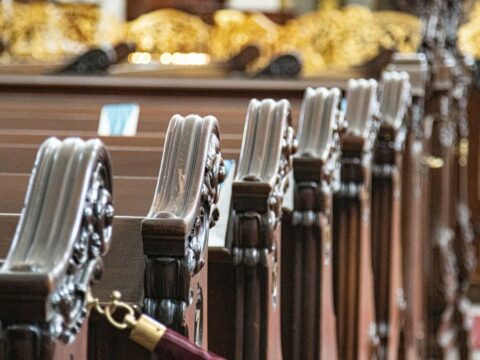In a scene from season 2 of the TV series The Chosen, Jesus and the apostle Matthew are sitting in an open field editing the first draft of the Sermon on the Mount. Matthew thinks the tone of the sermon is too negative, with all of its references to gouging out eyes and fruitless trees being cast into the fire. Jesus listens and responds firmly, “It’s a manifesto, Matthew. I’m not here to be sentimental and soothing. I’m here to start a revolution.”
As a television drama, The Chosen is itself a phenomenon. Around the world, something like 280 million people have watched this show about Jesus and his followers, in multiple languages across multiple platforms. In July, the fifth season — The Chosen: Last Supper — was released in Canada on Amazon Prime.
You may unsubscribe from any of our newsletters at any time.
As someone more aligned with progressive Christianity, but who grew up steeped in evangelical subculture, I have been skeptical whenever someone recommends I watch The Chosen. Will it be too earnest, too melodramatic, too capital-E Evangelical? Will the series erase Jesus’ Jewishness or his historical context in first-century Palestine? Is this Jesus truly revolutionary, or will his message be purely spiritual, with little attention paid to real-world systems of economic and political oppression? Perhaps most importantly — is the show any good?
Planned to span seven seasons, The Chosen achieves its epic runtime by filling out the stories of the whole cast of Gospel characters. Simon Peter is overwhelmed by tax debt from his fishing business; Matthew, the tax collector, is neurodivergent and has a difficult relationship with his family; Mary Magdalene struggles with addiction, relapsing even after she is healed by Jesus. Characters whose roles in the Gospels are small, like Nicodemus or Joanna, are given new narrative arcs. We see Jesus working behind the scenes with his closest friends to create a movement. Yet even as he becomes a first-century celebrity, his antics get him into trouble with the authorities — a slow-building tension drawn out over multiple seasons. In the season 5 trailer, scored by a Johnny Cash song, Jesus flips over tables as his disciples look on, aghast. This is as much a story about them (the “chosen”) as it is about him.
Christians from more mainline traditions will likely feel that the consistent emphasis on personal transformation is an evangelical anachronism, and the dialogue is not always nuanced. Yet the show is generic enough to be ecumenical, which helps explain its appeal to Catholic viewers, and scriptwriters have clearly attempted to place Jesus in his first-century Judaean religious and economic context.
Another welcome feature of the show is the multiracial cast, reflecting the diversity of Jesus’ followers then and now. The series is not explicitly political, although it does explore the racial tensions between Jews and Samaritans, as well as the violence of Roman imperial rule. It is likely intentional that while Jesus and his followers have generically “Middle Eastern” accents, the oppressing Romans sound American.
More on Broadview:
- ‘The Life of Chuck’ dares to be kind
- How ‘Sinners’ mirrors my break from the Black church
- The surprising science behind miracles
This is, to be sure, an overtly Christian television show. Creator and director Dallas Jenkins has said the goal of The Chosen is to bring the story of Jesus to the masses. (His father, Jerry B. Jenkins, co-wrote the massively popular Left Behind series of Christian apocalyptic novels.) Initial seasons were released by Angel Studios, the ultra-conservative media company behind Christian films like Sound of Freedom and Bonhoeffer. Many of the cast and crew are Christians, including Jonathan Roumie, the Catholic actor who plays Jesus, and most of the filming takes place in Texas and on Holy Land sets in Utah built by the Latter-day Saints.
The fact that the multimillion-dollar budget of The Chosen is primarily crowdfunded means a significant percentage of its audience, mainly American evangelical Christians, is deeply committed to the show’s vision. And the success of The Chosen has set it on a path toward broader audiences. A contract dispute with Angel Studios in 2024 shifted distribution of The Chosen to its own official app, as well as new deals with Amazon and the CW (an American television network). The app is full of behind-the-scenes footage, interviews with the cast and crew, and personal messages from Jenkins, further cultivating a sense of community and ownership for fans.
The Chosen joins an ever-growing list of screen adaptations of the story of Jesus, from Cecil B. DeMille’s silent epic The King of Kings to the hippie-era Godspell. It’s not bloody and disturbing like The Passion of the Christ, as psychological as Martin Scorsese’s Last Temptation or as postmodern and self-reflexive as (my personal favourite) Jesus of Montreal. But especially since it is a multi-season TV show rather than a movie, it has the time to expand the story of Jesus and his followers in some unique ways. Perhaps the best thing to say about The Chosen is that it’s like a church play: it’s far from perfect, but the community has worked hard to bring the story to life.
***
Brett Potter is an assistant professor of theology and religion at Huron University in London, Ont. He is currently teaching a course on Jesus in pop culture.













The show may bring the story to life, but is it an accurate story? Many already have misguided opinions of who Christ is, and who His followers are (and should be). Sometimes creative liberty can go too far.
the headline is much less balanced than the story. There is a lot of nuance in the first four seasons.